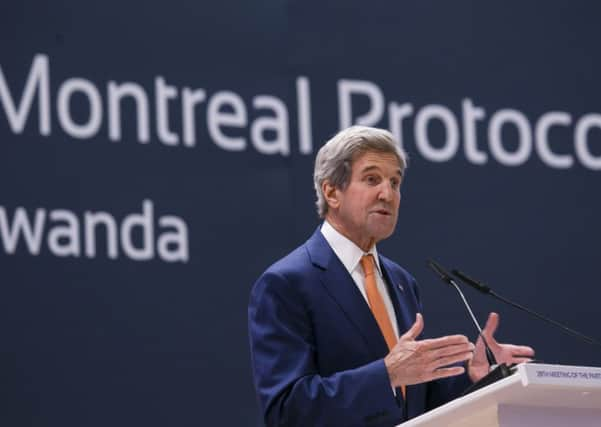Obama hails '˜ambitious' global deal to curb powerful greenhouse gases


US President Barack Obama called the deal – announced yesterday morning after all-night negotiations in Rwanda – “an ambitious and far-reaching solution to this looming crisis”.
Hydrofluorocarbons (HFCs) are used in air conditioners and refrigerators and experts say cutting them is the fastest way to reduce global warming.
Advertisement
Hide AdAdvertisement
Hide AdThe agreement is legally binding – unlike last year’s Paris Agreement to cut carbon emissions. It caps and reduces the use of HFCs in a gradual process beginning by 2019 with action by developed countries including the US, the world’s second-worst polluter. More than 100 developing countries, including China, the world’s top carbon emitter, will start taking action by 2024.
A small group of countries including India, Pakistan and some Gulf states pushed for and secured a later start in 2028, saying their economies need more time to grow. That’s three years earlier than India, the world’s third-worst polluter, had first proposed.
“It’s a very historic moment, and we are all very delighted that we have come to this point where we can reach a consensus and agree to most of the issues that were on the table,” said India’s chief delegate, Ajay Narayan Jha.
Environmental groups had hoped that the deal could reduce global warming by a half-degree Celsius by the end of this century. This agreement gets about 90 per cent of the way there, said Durwood Zaelke, president of the Institute for Governance and Sustainable Development. He said this is the “largest temperature reduction ever achieved by a single agreement”.
The agreement is “equal to stopping the entire world’s fossil-fuel CO2 emissions for more than two years,” said David Doniger, climate and clean air programme director with the US Natural Resources Defence Council.
HFCs were introduced in the 1980s as a substitute for ozone-depleting gases. But their danger has grown as air conditioner and refrigerator sales have soared in emerging economies such as China and India.